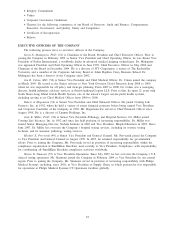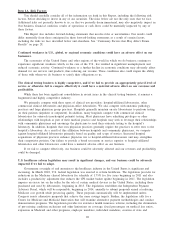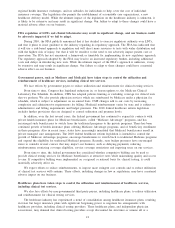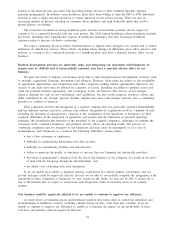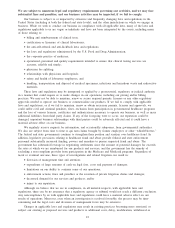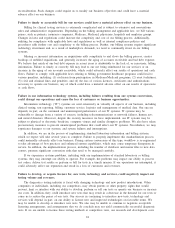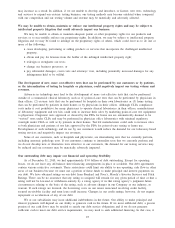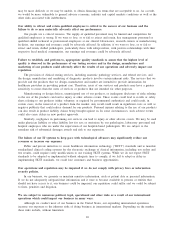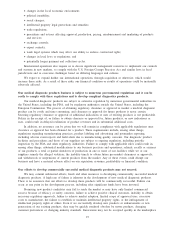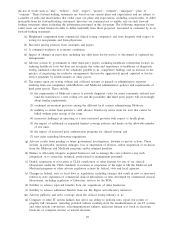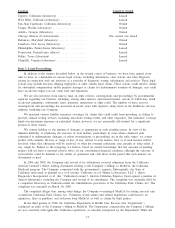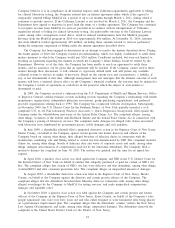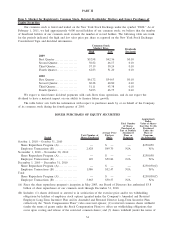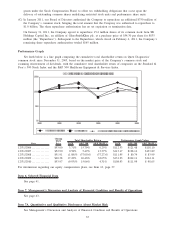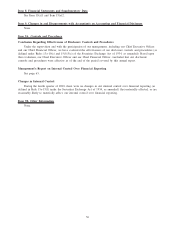Quest Diagnostics 2010 Annual Report Download - page 30
Download and view the complete annual report
Please find page 30 of the 2010 Quest Diagnostics annual report below. You can navigate through the pages in the report by either clicking on the pages listed below, or by using the keyword search tool below to find specific information within the annual report.•changes in the local economic environment;
•political instability;
•social changes;
•intellectual property legal protections and remedies;
•trade regulations;
•procedures and actions affecting approval, production, pricing, reimbursement and marketing of products
and services;
•exchange controls;
•export controls;
•weak legal systems which may affect our ability to enforce contractual rights;
•changes in local laws or regulations; and
•potentially longer payment and collection cycles.
International operations also require us to devote significant management resources to implement our controls
and systems in new markets, to comply with the U.S. Foreign Corrupt Practices Act and similar laws in local
jurisdictions and to overcome challenges based on differing languages and cultures.
We expect to expand further our international operations, through acquisition or otherwise, which would
increase these risks. As a result of these risks, our financial condition or results of operations could be materially
adversely affected.
Our medical diagnostic products business is subject to numerous governmental regulations and it can be
costly to comply with these regulations and to develop compliant diagnostics products.
Our medical diagnostic products are subject to extensive regulation by numerous governmental authorities in
the United States, including the FDA, and by regulatory authorities outside the United States, including the
European Commission. The process of obtaining regulatory clearance or approval to market a medical diagnostic
product can be costly and time-consuming, and clearance or approval for future products is never certain.
Securing regulatory clearance or approval of additional indications or uses of existing products is not predictable.
Delays in the receipt of, or failure to obtain clearance or approval for, future products, or new indications or
uses, could result in delayed realization of product revenues and in substantial additional costs.
In addition, no assurance can be given that we will remain in compliance with applicable regulations once
clearance or approval has been obtained for a product. These requirements include, among other things,
regulations regarding manufacturing practices, product labeling and advertising and postmarket reporting,
including adverse event reports and field alerts due to manufacturing quality concerns. Our diagnostic product
facilities and procedures and those of our suppliers are subject to ongoing regulation, including periodic
inspection by the FDA and other regulatory authorities. Failure to comply with applicable rules could result in,
among other things, substantial modifications to our business practices and operations; refunds, recalls or seizures
of our products; a total or partial shutdown of production in one or more of our facilities while we or our
suppliers remedy the alleged violation; the inability timely to obtain future pre-market clearances or approvals;
and withdrawals or suspensions of current products from the market. Any of these events could disrupt our
business and have a material adverse effect on our reputation, revenues, profitability or financial condition.
Our efforts to develop commercially successful medical diagnostic products may not succeed.
We may commit substantial efforts, funds and other resources to developing commercially successful medical
diagnostic products. A high rate of failure is inherent in the development of new medical diagnostic products.
There is no assurance that our efforts to develop these products will be commercially successful. Failure can
occur at any point in the development process, including after significant funds have been invested.
Promising new product candidates may fail to reach the market or may have only limited commercial
success because of efficacy or safety concerns, failure to achieve positive clinical outcomes, inability to obtain
necessary regulatory approvals, failure to achieve market adoption, limited scope of approved uses, excessive
costs to manufacture, the failure to establish or maintain intellectual property rights, or the infringement of
intellectual property rights of others. Even if we successfully develop new products or enhancements or new
generations of our existing products, they may be quickly rendered obsolete by newer products, changing
customer preferences or changing industry standards. Innovations may not be accepted quickly in the marketplace
27




